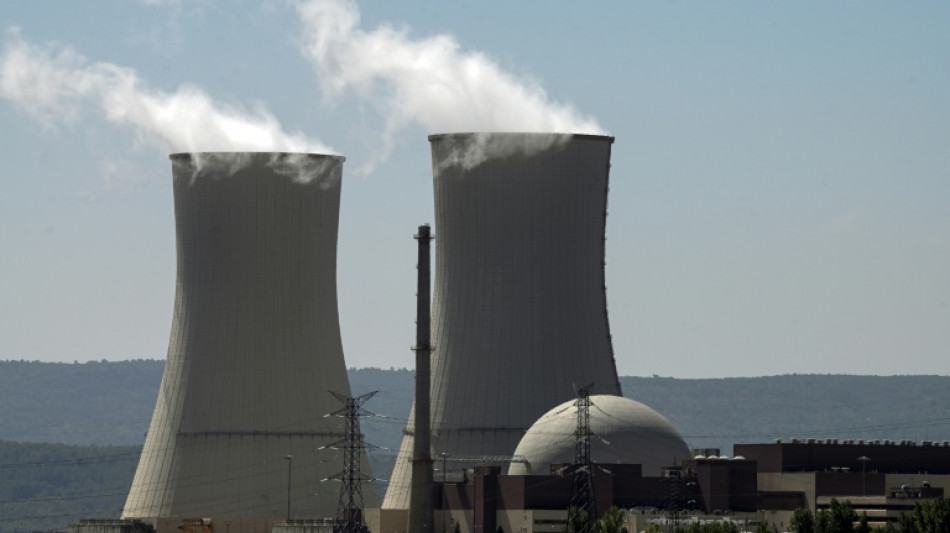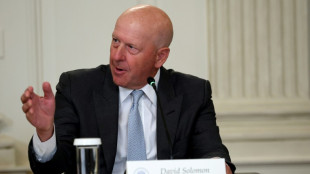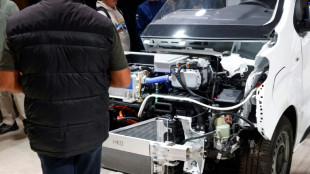
-
 Trump says Coca-Cola to switch to cane sugar in US
Trump says Coca-Cola to switch to cane sugar in US
-
US stocks finish higher as markets gyrate on Powell firing fears

-
 Swiss manager Weiler named new DC United head coach
Swiss manager Weiler named new DC United head coach
-
United Airlines profits dip but says Newark has rebounded

-
 World-first IVF trial reduces risk of babies inheriting diseases
World-first IVF trial reduces risk of babies inheriting diseases
-
World No.1 Sabalenka pulls out of WTA Montreal event

-
 EU mega budget hits immediate German opposition
EU mega budget hits immediate German opposition
-
Three quarters of US teens use AI companions despite risks: study

-
 Girelli fires Italy past Norway and into Euro 2025 semis
Girelli fires Italy past Norway and into Euro 2025 semis
-
Fire destroys stage at Belgian electro festival

-
 Trump slams own supporters as Epstein row grows
Trump slams own supporters as Epstein row grows
-
October execution date set for Texas man in 'shaken baby' case

-
 Goldman Sachs profits jump as CEO eyes more merger activity
Goldman Sachs profits jump as CEO eyes more merger activity
-
Trump slams 'stupid' Republicans as Epstein row grows

-
 EU unveils bigger long-term budget but risks fight with farmers
EU unveils bigger long-term budget but risks fight with farmers
-
Gaza aid point crush kills 20 people

-
 Yamal takes iconic Barcelona number 10 shirt
Yamal takes iconic Barcelona number 10 shirt
-
Trump says not firing Fed chair -- but not ruling out

-
 Markets fall on reported Trump plan to fire Fed chief
Markets fall on reported Trump plan to fire Fed chief
-
Argentina under Milei: a tale of two economies

-
 Real Madrid's Bellingham set to miss 12 weeks after shoulder surgery
Real Madrid's Bellingham set to miss 12 weeks after shoulder surgery
-
UK's Starmer suspends several Labour rebels

-
 Heat melts Alps snow and glaciers, leaving water shortage
Heat melts Alps snow and glaciers, leaving water shortage
-
EU unveils blueprint for boosted 2-trillion-euro budget

-
 Abrahamsen wins Tour de France stage as Pogacar survives scare
Abrahamsen wins Tour de France stage as Pogacar survives scare
-
Modric at AC Milan to 'stay competitive and in Europe' at 40

-
 20 people killed in aid point crush in southern Gaza
20 people killed in aid point crush in southern Gaza
-
Sweden flying under Euros radar ahead of England clash, says Asllani

-
 Decathlon world record holder Kevin Mayer sits out 2025 season
Decathlon world record holder Kevin Mayer sits out 2025 season
-
Iceland volcano erupts for ninth time since 2023

-
 Parish confirms Palace will appeal over Europa League demotion
Parish confirms Palace will appeal over Europa League demotion
-
'Serious questions' over UK secret Afghan relocations: PM

-
 Chelsea keeper Petrovic joins Bournemouth
Chelsea keeper Petrovic joins Bournemouth
-
Real Madrid confirm Vazquez departure

-
 British Open could return to Trump's Turnberry
British Open could return to Trump's Turnberry
-
Ukraine's wartime reshuffle: what we know

-
 No magic fix: 'Harry Potter' stars banned from driving
No magic fix: 'Harry Potter' stars banned from driving
-
Israel bombs Syria army HQ after warning Damascus to leave Druze alone

-
 'Incredible' Stokes put body on line for England: Root
'Incredible' Stokes put body on line for England: Root
-
Stocks steady as traders weigh inflation data, trade deal

-
 Liverpool eye blockbuster bid for Newcastle's Isak: reports
Liverpool eye blockbuster bid for Newcastle's Isak: reports
-
Italy sorts vast piles of post for popular Pope Leo

-
 Stellantis pulls plug on hydrogen fuel cell vans
Stellantis pulls plug on hydrogen fuel cell vans
-
Nvidia's Huang says 'doing our best' to serve Chinese market

-
 Man irked by Japan go-karting noise arrested for attempted arson
Man irked by Japan go-karting noise arrested for attempted arson
-
Global health aid sinks to 15-year low in 'era of austerity'

-
 German Wellbrock wins world 10km swim after water quality delay
German Wellbrock wins world 10km swim after water quality delay
-
Markets mixed as traders weigh trade deal, US inflation data

-
 Indonesian shoemakers fear Trump tariffs despite lower levy
Indonesian shoemakers fear Trump tariffs despite lower levy
-
Indonesia hails 'new era' with US after Trump trade pact


Spain under pressure to abort nuclear energy phase-out
Spain, a European renewable energy leader, is coming under increasing pressure from the right and business groups to reverse its plans to phase out its nuclear power plants by 2035.
At the height of enthusiasm for nuclear power in the 1980s, Spain had eight nuclear plants providing 38 percent of its electricity. Now it has five, providing 20 percent of its power.
Under the country's nuclear phase-out plans, agreed in 2019 under the government of Socialist Prime Minister Pedro Sanchez, these remaining plants will be closed over the next decade, as the country focuses instead on green energy sources such as solar and wind power.
But as the planned closure of the country's oldest and most powerful atomic plant at Almaraz in western Spain in 2027-28 approaches, calls are growing for Spain to follow in the footsteps of other European countries that are reviving their nuclear power.
The two reactors at Almaraz generate around seven percent of the total electricity produced in the European Union's fourth-largest economy.
Spain's decision to close its plants "was adopted in a completely different industrial, geopolitical, social and economic context" and no longer makes sense without "a viable alternative," the Nuclear Forum lobby group that represents the sector said in a statement.
Atomic power will be needed to meet Spain's electricity needs as demand will soar due to growing sales of electric vehicles and the expansion of data centres to accommodate the greater use of AI, it added.
- 'Absolutely necessary' -
Ignacio Sanchez Galan, the chairman of Spanish energy company Iberdrola, which operates several atomic power plants as well as renewable energy farms, said nuclear energy is "absolutely necessary" to keep the lights on.
Iberdrola is one of around 30 companies that signed a manifesto last month calling for the extension of Spain's nuclear power plants.
"Dismantling this infrastructure prematurely would cause irreparable economic and social damage," the manifesto said.
Since gas prices spiked with the Ukraine war, global interest in the nuclear sector is at its highest since the oil crises in the 1970s, according to the International Energy Agency.
The Netherlands and Sweden are planning to build new nuclear plants, while Belgium's new conservative-led government has reversed a two-decade pledge to phase out atomic power.
Italy's cabinet last month opened the door to a return to nuclear power, 25 years after the closure of its last reactors.
- 'Not ready' -
Spain's conservative main opposition People's Party (PP) has added to the pressure.
It has tabled a motion, which has been approved by the parliament, calling on the government to keep the nuclear plants in operation.
During a visit to the Almaraz plant last month, the influential PP head of Madrid's regional government, Isabel Diaz Ayuso, said the measure was necessary to "protect jobs and energy sovereignty" and warned that Spain was "not ready to replace nuclear energy".
The price of electricity in Spain could rise by 23 percent for domestic consumers and by 35 percent for businesses if the country's nuclear reactors are shut down, according to a study by PwC.
Abandoning nuclear power is a "big change" because it means replacing a "constant and predictable energy supply" with "more volatile" sources such as solar and wind, Enric Bartlett, a professor of environmental law at Esade Law School, told AFP.
But it should be possible to close the remaining nuclear plants "without disruption" if Spain has the right amount of installed capacity to generate electricity by other means by 2035, and the "appropriate transport and storage networks", he added.
"There will have to be a significant increase in investment," Bartlett said.
U.AlSharif--SF-PST
